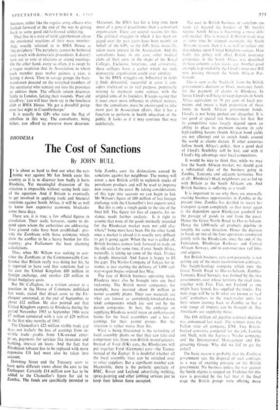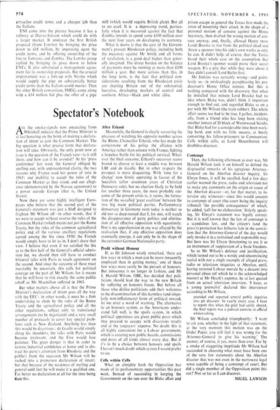The Cost of Sanctions
RHODESIA
By JOHN BULL
IT is about as hard to find out what the eco- nomic war against Mr Ian Smith costs this country as it is to discover how badly it hurts Rhodesia. Yet meaningful discussion of the situation is impossible without seeing both sides of the equation. And if Britain is eventually to get involved in applying trade and financial sanctions against South Africa, it will be as well to know how expensive economic blockades come these days.
There are, it is true, a few official figures in circulation. Their scale, however, seems to de- pend upon whom the authorities are addressing. Two ground rules have been established: pro- vide the Zambians with those estimates which show the conflict to be a heavy burden for this country; give Parliament the least alarming calculations.
Thus, when Mr Wilson was seeking to con- vince the Zambians at the Commonwealth Con- ference that Britain really was doing her bit, he is reported to have said that sanctions had so far cost the United Kingdom £80 million in foreign exchange, and another £20 million in direct budgetary costs.
But Mr Callaghan, in a written answer to a question in the House of Commons published last week, stated that direct costs to the Ex- chequer amounted, at the end of September, to about £12 million. He also pointed out that United Kingdom exports to Rhodesia during the period November 1965 to September 1966 were £7 million compared with a rate of £29 million in the first nine months of 1965.
The Chancellor's £22 million visible trade gap does not include the loss of earnings from in- vi•ible trade—profits from UK-owned enter- pres, payments for services like insurance and banking, interest on loans. And the fact that Rhodesian tobacco has to be replaced with more expensive US leaf must also be taken into account.
Downing Street and the Treasury seem to have quite different views about the cost to the Exchequer. Certainly £14 million now has to be added to the Chancellor's figure for aid to Zambia. The funds are specifically intended to
help Zambia cure the dislocations caused by sanctions against her neighbour. The money will cover a new British airlift to replenish stocks of petroleum products and will be used to improve new routes to the coast. By taking considerations of this type into account we can begin to link Mr Wilson's figure of £80 million of lost foreign exchange with the Chancellor's lost exports total.
But this is only a rough guide to the size of the final bill. The figure for loss of exports, for in- stance, needs further analysis. Is it right to assume that none of the goods normally intended for the Rhodesian market were not sold else- where? Some must have been. On the other hand, once a market is closed it is usually very difficult to get it going again. When the war is called off, British business cannot look forward to trade on the old scale for some time, if ever. South Africa, naturally, is taking up some of the slack. France is deeply interested. And Japan is happy to fill the gaps. The Nissho Company of Tokyo, for in- stance, is just starting the delivery of 1,000 rail- way-wagon bogies ordered last May.
The fate of British business operating inside Rhodesia must also be brought into any final reckoning. The British motor companies, for example, have invested about £6 million in motor assembly plants. Their raw materials arc what are known as completely-knocked-down (ckd) components which are sent out by the parent companies. At best, the embargo on supplying Rhodesia would mean an embarrassing hiatus for the local assemblers and a loss of earnings for their parent. groups. But the situation is rather worse than this.
What is being threatened is the re-tooling of local assembly plants so that they can take ckd component kits from non-British manufacturers. Instead of Ford (UK) cars, the Rhodesians will put together Ford (Germany) cars—the Taunus instead of the Zephyr. It is doubtful whether all the local assembly lines can be switched over to other suppliers. But a significant number can. Meanwhile, there is the pathetic spectacle of BMC, Rover and Leyland advertising welding, spray-painting and other jobbing services just to keep their labour force occupied. The cost to British business of sanctions ex- tends far beyond the borders of Mr Smith's
regime. South Africa is becoming a more diffi- cult market. This is natural. If British trade may at some time be stopped overnight. the South Africans reason, then it is as %% ell to reduce any dependence upon United Kingdom sources. How badly this policy will affect British insurance companies in the South Africa ‘N as described in these columns a few weeks ago. Another good example is provided by the 1.1o■d's insurance Bill now passing through the South African Par- liament.
This is seen as the 'backlash' from the British government's decision to block insurance funds for the payment of claims in Rhodesia. In future Lloyd's will have to keep deposits in South Africa equivalent to 70 per cent of local pre- miums and invest a high proportion of these funds in South African government bonds. Lloyd's is not being pushed out altogether. It is too good at special risk business for that. But its competitive rates largely depend upon an ability to place its premium income in safe high-yielding havens (South African bond yields are not alluring) and to switch funds around the world as claims dictate. If other countries follow South Africa's policy, then a good deal of Lloyd's flexibility will be lost, and with it Lloyd's big advantage over local competitors.
It would be nice to think that, while we may lose the South African market, we should gain a substantial slice of the business going in Zambia, Tanzania and adjacent territories. Not at all: Rhodesia's black neighbours are as fed up with Britain as the South Africans are. And British business is suffering as a result.
It is important to see why there are unusually exciting business opportunities in Zambia at the present time. Zambia has decided to recast her transport system completely so that never again is she dependent upon Rhodesian goodwill for the passage of goods to and from the coast. Hence the Great North Road to Dar-es-Salaam. Hence the 1,000-mile oil products pipeline in roughly the same direction. Hence the decision to break up two of the four operations conducted jointly with the Rhodesians since the end of the Federation, Rhodesian Railways and Central African Airways, and to construct new rail links and airports.
But British business, very conspicuously, is not getting any of the main reconstruction contracts. The freight-haulage company which runs the Great North Road to Dar-es-Salaam, Zambia- Tanzania Road Services, was formed by the two governments over whose territory the road runs, together with Fiat. Fiat, not Leyland as one might have hoped, has supplied the trucks. The next stage will be to fit what are known as 'seal tank' containers to the truck-trailer units for their return journey back to Zambia so that a wide range of imports can be brought in. The Americans arc supplying those.
The £16 million oil pipeline contract decision was announced last week. The winners were the Italian state oil company, EN!. Two British- backed consortia competed for the job, Lonrho and Shell, with the Japanese Nissho company, and the International Management and En- gineering Group. Why did we fail to get the order?
The basic reason is probably that the Zambian government sees the disposal of such contracts as a way of exerting pressure on the British government. No business unless the war against the Smith regime is stepped up. Evidence for this view is provided by the fact that at the final stage the British groups were offering more attractive credit terms and a cheaper job than the Italians.
ENI came into the picture because it has a refinery at Dar-es-Salaam which could do with a larger market. It undercut the first British proposal (from Lonrho) by bringing the price down to £18 million, by improving upon the credit terms, and by offering ownership of the line to Tanzania and Zambia. The Lonrho group replied by bringing its price down to below ENI's. It also substituted a management agree- ment for its ownership proposals. But the crucial improvement was a link-up with Nissho which would supply the pipe on substantially better credit terms than the Italians could muster. Then the other British consortium, 1MEG, came along with a £14 million bid plus the offer of a pipe mill (which would require British plate). But all to no avail. It is a depressing trend, particu- larly when it is measured against the fact that Zambia intends to spend some £430 million over the next four years on developing its economy.
What it shows is that the cost of the Govern- ment's present Rhodesian policy, including both the measures against Mr Smith and all forms of retaliation, is a good deal higher than gener- ally imagined. The direct burden on the balance of payments must be running at more than £100 million a year. But more serious than this, in the long term, is the fact that political con- siderations resulting from the Rhodesian crisis are shutting Britain out of the substantial, lucrative, developing markets of central and southern Africa—black and white alike.



































 Previous page
Previous page